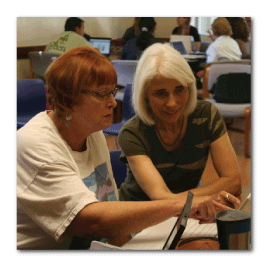
Emerging from research collaborations started over 20 years ago, the WISE Community develops instructional programs that use educational technology to help middle school and high school students master complex scientific concepts. This community consists of partnerships between teachers, educational researchers, practicing scientists, and technology experts. WISE projects and software are developed by researchers in the Technology Enhanced Learning in Science (TELS) Community. The TELS Community includes partners at thirteen universities, a nonprofit educational research and development organization, and fifteen school districts. Local WISE teachers collaborate on research projects by providing their practitioner's perspective during annual summer retreats and teacher interviews.
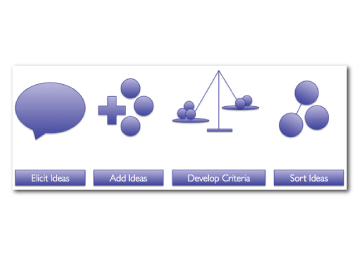
Students grapple with multiple, conflicting, and confusing ideas about science. WISE curriculum and technology development is driven by a rich research tradition that has shown that instruction is most effective when teachers use students' views as a starting point for scientific investigations. When teachers and instructional materials guide learners as they articulate their repertoire of ideas, add new ideas, sort out their ideas in a variety of contexts, and make connections at multiple levels of analysis, they develop more nuanced criteria for evaluating ideas, and, ultimately, formulate a linked set of views about scientific phenomena. TELS Director Marcia C. Linn characterizes this as the Knowledge Integration framework and it forms the basis of WISE projects and assessments. (For more information, visit the TELS website and view our research publications.)
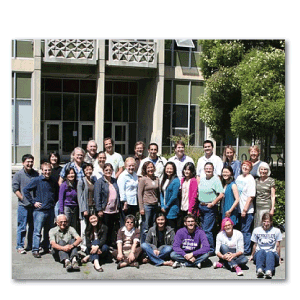
- Curriculum development: Create and document new learning environments enriched by computer visualization of scientific phenomena that teachers can customize; test these learning environments in school with diverse student populations.
- Professional development: Increase the number and diversity of teachers and administrators who can take full advantage of technology-enhanced science education.
- Graduate education: Expand graduate programs that prepare leaders and experts in science education technology, curriculum development, professional development and education policy.
- Science education research: Increase the amount and quality of research examining how effectively technology can improve science learning.
- Effective use of technology: Form partnerships dedicated to enhancing technology-enhanced science education; form open source communities to design improved instructional materials.
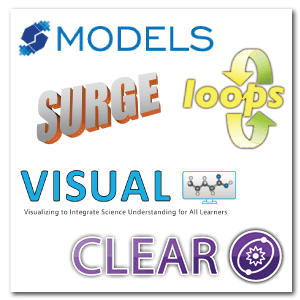
The TELS Community currently operates five NSF funded research projects:
- The CLEAR project investigates how science assessments can both capture and contribute to cumulative, integrated learning of energy in middle-school science courses.
- The VISUAL project investigates, compares, and refines promising visualizations to determine when and how they improve physical science learning.
- The LOOPS project makes innovative use of technology to allow teachers to make data-based decisions about alternative teaching strategies during the course of instruction.
- The MODELS project enables middle and high schools to design and sustain school-based professional development and supports teachers as they integrate technology-enhanced science curricula into existing instruction.
- The SURGE project harnesses popular videogame design principles to help students learn challenging ideas in Newtonian mechanics.
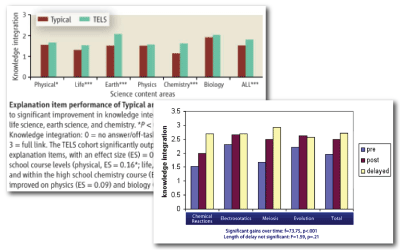
WISE curricula have been tested in middle and high school classrooms for over two decades in more than ten school districts. Prior research has shown that WISE curriculum units improve student learning of difficult standards-based science topics (Linn et al., 2006) and that students continue to integrate their ideas and strengthen their understanding even after the units have been completed. For more information about WISE learning results, visit the TELS publications database.
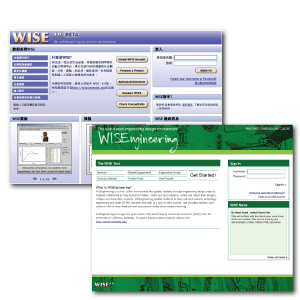
As an open source platform, WISE can support a range of curriculum development and instructional technology research agendas. Originally developed to support research on inquiry-based science learning in middle schools and high schools, WISE has been adapted to support research in K-12 and college-level engineering education (http://www.wisengineering.org), support research on how high school students construct arguments using database evidence in University of Washington, combined with a learning management system to research computer science education at the university level at UC Berkeley, and translated into Chinese to support earth science education in Taiwan (http://cwise.gise.ntnu.edu.tw/cwise/). Independent K-12 teachers have also created their own curriculum for different subject areas using the WISE platform. These adaptations and independent creations are a testament to WISE's ease of use and flexibility as a curriculum and instructional technology platform.
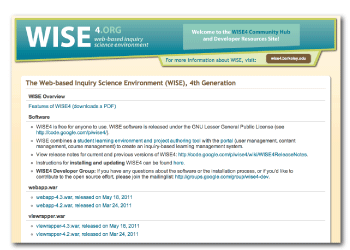
We have created an active and dynamic software developer community around WISE. Custom WISE servers have been installed at the University of Washington, University of Virginia, University of Toronto, and the National Taiwan Normal University. Some of these adopters have already run WISE projects in local classrooms and collected research data (University of Washington), while others are preparing for pilot runs for this coming fall (University of Virginia and Taiwan Normal). WISE adopters have re-skinned the WISE website, helped us translate WISE into traditional Chinese, and are actively creating new step types and learning activities. For more information about collaborating with WISE and how to install our software on your own server, visit our Developers Site (http://wise5.org) and join our WISE Developers Google Group.
We are always looking for new research and development collaborations. If you are interested in connecting with the WISE research community or have any questions, please contact us!




